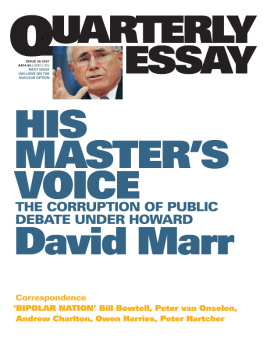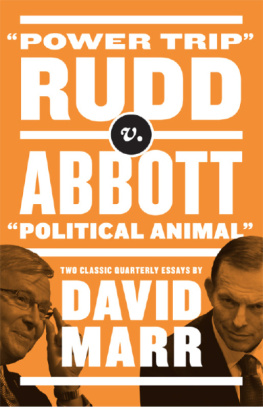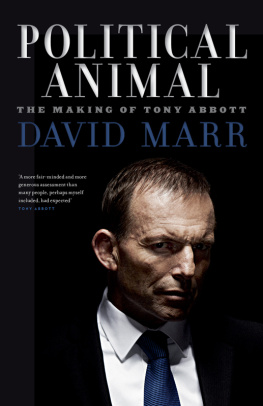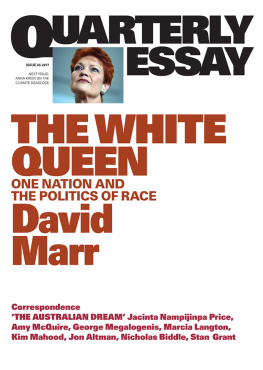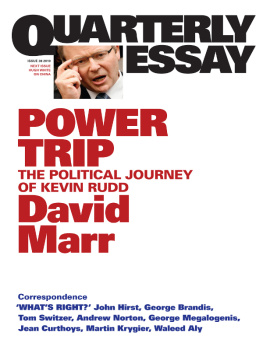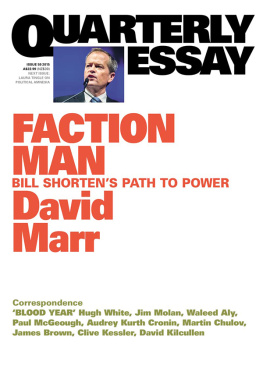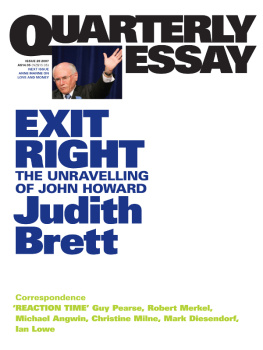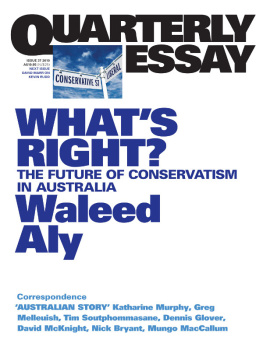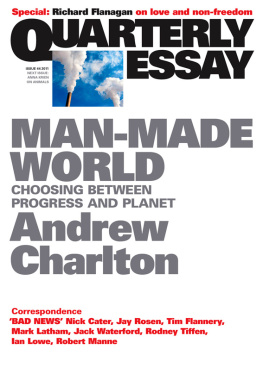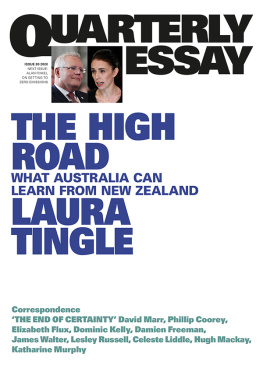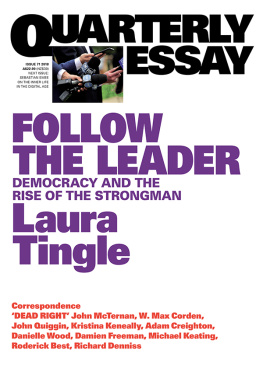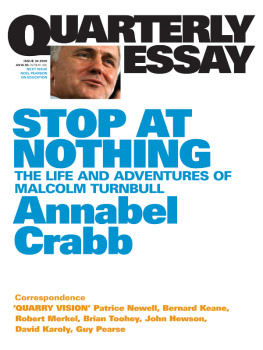Quarterly Essay is published four times a year by Black Inc., an imprint of Schwartz Publishing Pty Ltd. Publisher: Morry Schwartz.
ISBN 9781863954051 ISSN 1832-0953
ALL RIGHTS RESERVED.
No part of this publication may be reproduced, stored in a retrieval system, or transmitted in any form by any means electronic, mechanical, photocopying, recording or otherwise without the prior consent of the publishers.
Essay & correspondence retained by the authors.
Subscriptions (4 issues): $49 a year within Australia incl. GST (Institutional subs. $59). Outside Australia $79. Payment may be made by Mastercard, Visa or Bankcard, or by cheque made out to Schwartz Publishing. Payment includes postage and handling.
To subscribe, fill out and post the subscription card, or subscribe online at:
www.quarterlyessay.com
Correspondence and subscriptions should be addressed to the Editor at:
Black Inc.
Level 5, 289 Flinders Lane
Melbourne VIC 3000 Australia
Phone: 61 3 9654 2000
Fax: 61 3 9654 2290
Email:
quarterlyessay@blackincbooks.com (editorial)
subscribe@blackincbooks.com (subscriptions)
Editor: Chris Feik
Management: Sophy Williams
Production Co-ordinator: Caitlin Yates
Publicity: Anna Lensky
Design: Guy Mirabella
Printer: Griffin Press
The Corruption of Public
Debateunder Howard
David Marr
As the clever hopes expire
Of a low dishonest decade
W.H. Auden
THE OLD VOLTAIREAN
The habits of luxury hotels are hard to break. Though Saigon is now the communist metropolis of Ho Chi Minh City, the best hotels cluster where they always have, around Lam Son Square. There in the Park Hyatt John Howard faced the Australian press in November last year. The event was low-key: no podium, no flags and little time. These were the last hours of the Prime Ministers first visit to Vietnam and his motorcade was about to leave for the airport. Howard had called the press together to plug nuclear power and farewell Ian Thorpe from the pool. He was relaxed. A week of hobnobbing with the leaders of APEC had climaxed late the night before in a restaurant where the Bushes and the Howards feasted alone on crabs and lotus-seed soup. The President paid.
David Speers from Sky News caught the Prime Ministers eye. Just before you leave Vietnam, can I ask you, do you think the Vietnam War was a mistake?
Someone had asked at last. From the moment Howard arrived in Vietnam, he had been lavishing praise on the communist regime. He spoke of the Vietnamese as people after his own heart with entrepreneurial flair and spirit committed to the role of small and medium-sized enterprises. He imagined a future in which Australia and Vietnam were forever linked in the fastest-growing area of the world economy. One night at an Asialink dinner, he made a vague allusion to the war: Australias relations with Vietnam have, of course, gone through a number of iterations. Its an awkward word for ten years of combat.
Once the Howards and their entourage travelled south from the APEC meetings in Hanoi, the war was everywhere. They lit incense at a cemetery for the war dead of Vietnam at Go Cat. They drove in convoy to the rubber plantation at Long Tan where eighteen Australians died in a single night of fighting forty years ago. John Howard laid a wreath and expressed a few regrets: not for the 500 Australians, the one and a half million Vietnamese military and the two million civilians who died in the war. To a handful of Australian veterans gathered at the white cross that marks the battlefield, Howard acknowledged the shabby treatment soldiers had back home when they returned from the fighting. We wont make that mistake again.
Speers woke next morning thinking it odd that no one in the press pack had asked Howard simply and directly what he thought of the war. He had been telling us a lot during the week about the success of Vietnam and the great opportunities it afforded for Australian business, he told me. But the question of the war hadnt been raised. This seemed particularly odd because of the obvious parallels with Iraq. I must confess it didnt strike me until the day we were leaving that, hang on a minute, does he still think that fighting the Vietnam War was the right thing to do when the rest of the world has moved on?
Howard took his time answering Speers question. He was thinking it out carefully as he spoke.
I supported our involvement at the time and I dont intend to recant that. I believe that in public life you are accountable for the decisions that you take. I mean, I didnt hold any position of authority then, but I supported the reasons for Australias involvement and nothing has altered my view that at the time, on the assessments that were made then I took that view properly. And I dont intend to indulge this preoccupation that many have in recanting everything that they supported when they were in positions of authority.
Journalists glanced at one another. Was he bagging Malcolm Fraser? Or perhaps Robert McNamara, the former US secretary of defence who now says the Vietnam War was wrong, terribly wrong? Howard wasnt naming names. His point was that conceding the truth isnt his style.
I think in public life you take a position and I think particularly of the positions Ive taken in the time Ive been prime minister. I have to live with the consequences of those both now and into the future. And if I ever develop reservations, well, I hope I would have the grace to keep them to myself You take a position and youve got to live by that and be judged by that and thats my position.
At the heart of democracy is a contest of conversations. The tone of a democracy is set by the dialogue between a nation and its leaders. For the last decade, Australia has had a prime minister who thinks it beneath him to admit mistakes. Speers could hardly believe his ears: He was virtually saying, even if I think Im wrong, Im not going to tell you. In one of the few press commentaries on this extraordinary moment, my colleague Peter Hartcher wrote of Howard putting himself beyond political resolve into a realm of almost superhuman recalcitrance.
Debate ploughs on in Australia. Hansard is fatter than ever. The Prime Minister is always at the microphone. But after being belittled for most of his political career, Howard came to power determined public debate would be conducted on his terms. They are subtle, bizarre and at times brutal. This essay is about those terms and why Australians put up with them. Since 1996, Howard has cowed his critics, muffled the press, intimidated the ABC, gagged scientists, silenced non-government organisations, neutered Canberras mandarins, curtailed parliamentary scrutiny, censored the arts, banned books, criminalised protest and prosecuted whistleblowers.
This is not as Howard advertised himself on arrival. Then he spoke proudly of his partys tradition of defending individual liberty and the rule of law. He still does. He painted his victory as a repudiation of stultifying political correctness that left Australians able to speak a little more freely and a little more openly about what they feel. The ravings of Pauline Hanson he represented as a triumph of free speech over stifling orthodoxy. And after Aboriginal protesters burnt the flag on Australia Day last year, he rejected calls for their prosecution. Much in all as I despise what they did, I do not believe that it should be a criminal offence, he told Neil Mitchell of radio 3AW in Melbourne. I do hold to the old Vol-tairean principle that I disagree with what he says but I will defend to the death his right to say it, and I see that kind of thing as just an expression, however offensive to the majority of the community, an expression of political opinion.

